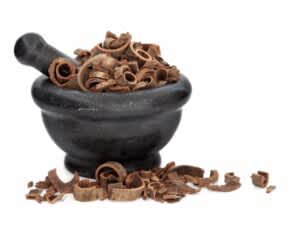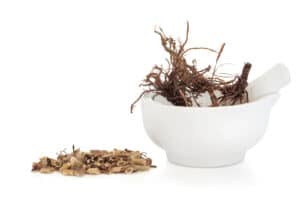Ashwagandha is a medicinal plant that has traditionally been used for a variety of purposes, including helping reduce insomnia symptoms. Contemporary research seems to support that ashwagandha supplements may help people sleep better. While more research is needed, ashwagandha seems to be most helpful for people with insomnia who take the supplement for over eight weeks.
“Insomnia is a common experience for many,” says Dr. Abhinav Singh, M.D., “but if left unaddressed, it can develop into a chronic condition that significantly impacts our overall well-being. Untreated insomnia can lead to serious health issues, and affect our relationships and daily functioning.”
Learn more about its safety, effectiveness, and whether taking ashwagandha to promote sleep might be appropriate for you.
What Is Ashwagandha?
Ashwagandha is an herbal supplement made from an evergreen shrub containing many biologically active substances. It has a long history of medicinal use, particularly in Ayurveda, a system of traditional medicine that originated in India. Ayurvedic medicine is a holistic system that combines plant medicine with lifestyle changes to promote physical and mental health.
In recent years, ashwagandha has become more widely used in the United States, even trending on social media. Ashwagandha is considered to be an adaptogen, a type of herbal medicine that may help the body adapt to stress. Ashwagandha has been promoted as a sleep aid and treatment for insomnia.
Some of the biologically active compounds in ashwagandha are present only in certain parts of the plant, such as the leaves or roots. Many commercially available ashwagandha products only contain extracts from the roots, or a combination of different parts of the plant. The leaves, flowers, and seeds also have traditional uses.
Ashwagandha is also called winter cherry, Indian Ginseng, and by its botanical name, withania somnifera. Somnifera means sleep-inducing.
What Are Ashwagandha Benefits?

People promoting or selling ashwagandha have made many claims about its benefits, including helpful effects on stress, anxiety, male fertility, and athletic performance, along with anti-inflammatory and antioxidant properties
Research conducted to date has demonstrated some benefits, especially for insomnia and stress. There is also some evidence that long-term use may increase male hormones and fertility. Animal studies of ashwagandha have shown it helps increase physical endurance and reduce cortisol produced by stress.
Experts have raised some concerns about the quality of the research on ashwagandha’s benefits. One limitation of the existing research studies examining the benefits of ashwagandha is their small size, since a large sample of individuals is needed to fully understand the range of responses to the herb.
Additionally, different types of ashwagandha-containing preparations have been used across studies, rather than a standard product, making it difficult to identify how studies compare to one another or apply to ashwagandha products available to the public. Not many randomized, controlled, double-blinded studies, which experts consider to be the gold standard of research, have been done on ashwagandha. For these reasons, experts believe there is a need for larger, high quality studies examining ashwagandha’s benefits.
What Does Ashwagandha Do for Sleep?
Traditional Ayurvedic medicine has used ashwagandha root and whole plant extract to help people get to sleep for thousands of years. Recent research has substantiated that ashwagandha treatment may help people get to sleep more quickly and experience better sleep quality.
Human research studies have evaluated how ashwagandha affects sleep quantity, the time it takes to get to sleep, time spent awake during the night, and morning alertness. Some research shows ashwagandha treatment improves all aspects of sleep compared to a placebo.
Research has also found that long-term use of ashwagandha works best, and people with a history of trouble falling asleep benefit most. A systematic review and meta-analysis of five studies found that people with insomnia who took ashwagandha each day for over eight weeks experienced the most beneficial effects. Also, the sleep quality of older adults in particular benefited from treatment with ashwagandha root extract.
A number of compounds that are calming to the nervous system have been identified in ashwagandha roots. Substances found in ashwagandha roots can reduce stress hormones and activate brain chemicals that promote sleep. Animal research has shown that ashwagandha leaves potentially contain additional sleep-inducing compounds that may help with insomnia.
Ashwagandha has traditionally been used to help people cope with stress, which can interfere with sleep. A number of animal and human studies have shown that ashwagandha helps improve symptoms of stress and anxiety, potentially easing sleep difficulties.
How to Use Ashwagandha for Sleep
How you use ashwagandha depends on the formulation you choose. Ashwagandha is available in powder, capsule, gummy, and tincture forms. Often, ashwagandha is sold in formulations that include other supplements, as well. Products designed to support sleep vary in strength. Follow the dosage instructions on the product you purchase or the advice of your healthcare provider.
Ashwagandha’s traditional use in Ayurveda is more holistic than simply taking an herb to immediately treat a symptom like insomnia. Ayurvedic medicine involves a practitioner carefully evaluating an individual to understand how their life force and bodily energies may be out of balance.
Tailored treatment to rebalance a person’s energy may involve exercise, dietary changes, meditation, yoga, massage, and internal cleansing, as well as herbs like ashwagandha. When ashwagandha is recommended by an Ayurvedic practitioner, it is often used in the form of a powder that may be mixed with clarified butter, honey, or water.
What Are Ashwagandha’s Side Effects?
While ashwagandha generally appears to be safe, some side effects have been reported. Side effects are more likely to occur with large doses. Reported side effects include:
- Stomach pain or upset
- Nausea and vomiting
- Loose stools or diarrhea
- Drowsiness
Rare cases of liver injury have been reported.
Should You Take Ashwagandha?
Ashwagandha is generally regarded as safe, so most people can try taking it to see if it helps them sleep better. However, ashwagandha should be avoided by certain people, in whom its safety has not been established. These include people who:
- Are pregnant: There is some evidence that using ashwagandha might increase the risk of miscarriages.
- Are breastfeeding: The safety of ashwagandha during breastfeeding has not been established, so it is best to avoid using it if you are breastfeeding.
- Have autoimmune diseases: Ashwagandha may stimulate the immune system, which can be harmful in people whose immune systems attack their own tissues. If you have been diagnosed with lupus, multiple sclerosis, rheumatoid arthritis, or another autoimmune disease, avoid ashwagandha.
- Take medication that may interact with ashwagandha: Since ashwagandha may affect the way certain medications work, it should be avoided if you take blood pressure medication, immunosuppressants, and drugs that lower blood sugar.
- Are about to have surgery: Ashwagandha may interact with anesthesia and other medications used during surgery, so it should be discontinued at least two weeks before surgery.
- Have thyroid issues: Research in both mice and humans has shown that ashwagandha may cause thyroid hormones to increase. Rare cases of thyrotoxicosis, a medical condition caused by high levels of thyroid hormone, have been reported in some people taking ashwagandha.
If you want to take ashwagandha or any other herbs or supplements, first talk with your primary care provider and any other doctors that prescribe you medication. This will ensure that no harmful medication interactions occur.
“Don’t sleep on your sleep problems,” says Dr. Singh. “If they persist, seek professional help sooner rather than later. Poor sleep has negative impacts on every aspect of your health.”
References
The Sleep Doctor Forum: Real Experiences, Real Connections
Continue the discussion on the Sleep Doctor Forum. Connect with experts and fellow forum members on CPAP, sleep apnea, and all things sleep. A priceless resource that’s free to join.







































